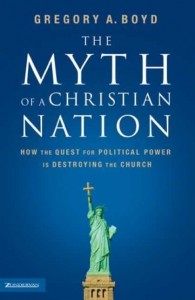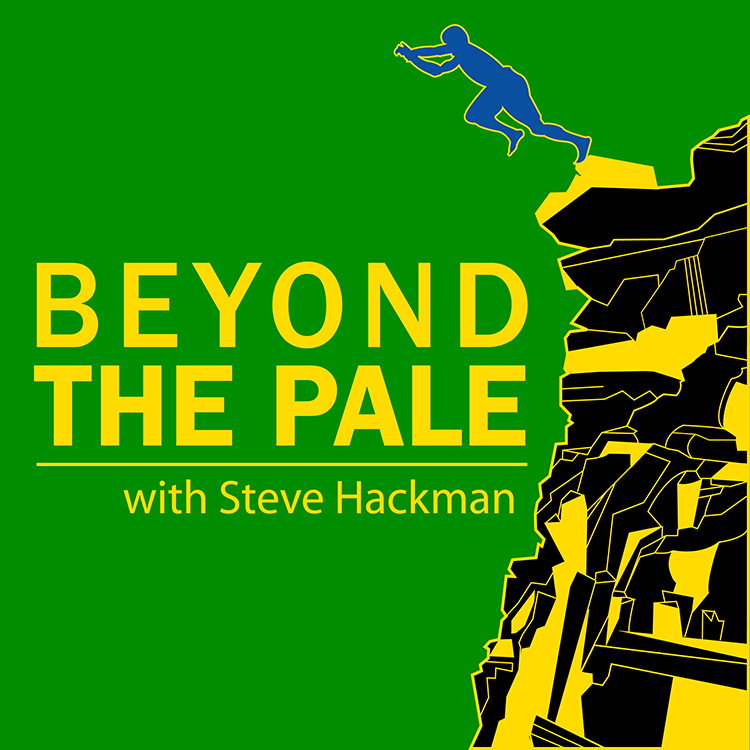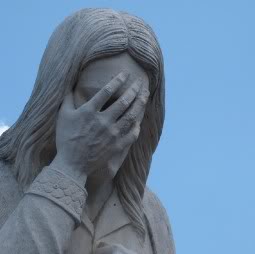The Myth of a Christian Nation: A Review
 There is an old church joke that goes something like this:
There is an old church joke that goes something like this:
A ship sinks and two guys survive but are stuck in a life raft in the middle of the ocean. The first man is panicked and looking out at the endless sea around them shouts, “What are we going to do?”
The second man gently responds, “Calm down, we’ll be fine.”
The first man unconvinced goes on, “We NO food…we have NO water!”
The second man stretches himself comfortably against the side of the raft and says, “Relax, we’re going to be OK.”
The first man is inconsolable. “How can you say we’re going to be OK? We are going to DIE out here!”
The second man leans his head back, closes his eyes and replies, “Everything is going to be OK. I’m the biggest tither in my church. Believe me when I say my pastor WILL find me.”
For some reason I had this joke in my head while I was reading Greg Boyd’s The Myth of a Christian Nation. Knowing Boyd was a megachurch pastor in America I kept wondering if he could have any people left after touching on a topic so close to the American evangelical identity. Sure enough Boyd acknowledges that when he preached a six week series called “Cross and the Sword” on which he based the book he lost 1000 people in his church. (700 when he first preached it…and another 300 when he returned to the topic just before the election). Those poor guys in the life raft would really have been in trouble if Boyd was their pastor!
Probably the main stumbling block for most Christians in America though would be the name of the book. Those whom The Myth of a Christian Nation would bless the most are probably the least likely to read it because of it’s title.
Heck, not long ago I probably wouldn’t have read it.
Although the book has a focus on the American relationship to Christianity it is more accurate to say it is a treatise contrasting the Kingdom of God with the Kingdoms of the World and Boyd arguing that all nations of the earth, America included, are firmly embedded in the latter.

The Kingdoms of the World exercise authority using “power over.” Jesus eschewed this option consistently throughout his time on earth and demonstrated the authority of his Kingdom would come from humility and servitude culminating with his death at Calvary. Rather than have legions of servants deliver him from death and then take his Kingship by force (as is the way of the world) he entrusted himself to God who vindicated his Kingdom by raising Him from the dead.
Rather than “power over” Jesus used “power under”.
Boyd argues that Americans in particular have done a great disservice to the Kingdom of God by having the church grasp for political power in ways that destroy the credibility of our witness. Rather than being viewed as Christ like examples of loving servants, the church is instead viewed with disdain as “behavior police” attempting impose a particular strain of morality on society.
Says Boyd:
The Kingdom of God is not a Christian version of the kingdom of this world. It is, rather, a holy alternative to all versions of the kingdom of this world, and everything hangs on kingdom people appreciating and preserving this holiness.
The Myth of a Christian Nation (pg. 86)
America as a new Israel ?
Boyd also takes aim at the driving force behind the evangelical cry to “Take America back for God.” Transferring the covenant promises and relationship God had with Israel to America, many Christians in the States see it as their duty to return America to God when they perceive the nation has “gone astray.”
This means:
many Christians turn to the Old Testament more than the New in their understanding of America and the role of the church within America. Consequently, Christians often turn to models of the Old Testament “watchmen” (Ezek. 33) and of John the Baptists to understand what they are supposed to be doing in the culture, rather than the model of Jesus. Instead of living to sacrifice for others, we become the official “sin-pointer-outers.” Instead of gaining a reputation of being humble servants who manifest Calvary-quality love, we gain a reputation for being moralistic and self-rightous. And predictably, we drive away the tax collectors and prostitutes of our day, just as the Pharisees did, rather than attracting them, as Jesus did. (Pg. 155)
In The Myth of a Christian Nation Dr. Greg Boyd probes at some of the deepest and most sensitive layers of American evangelical identity. Like Jesus, who said some very difficult things which cut against the cultural and religious identity, many who hear Dr. Boyd will “follow him no more.”
But as Jesus also explained, “Those than can receive it…should receive it.”
10 comments
Comments are closed.





I admire people who prefer truth over popularity. Thanks for the article
It is amazing that so many countries that once sent missionaries all over the world, are now desperately needing the same gospel of God’s Grace!
Agreed Chris, and many of the cultures we reached in the past are stuck in a “law” based faith that makes it hard for them to even understand “grace”
I read this a few years ago and, although I didn’t agree with everything, really enjoyed it (I finally learned that I don’t HAVE to agree with everything to get something out of a book like this, nor is my faith threatened by it). My favorite book by Boyd, however, is Letters from a Skeptic, which is a compilation of letters written by Boyd to his father, and vice-versa, where Boyd explains the Christian faith and his dad is slowly converted. Interwoven is a beautiful story of their relationship. I highly recommend it.
Bob, I will certainly check out the other Boyd book. I read this one based on a friend’s suggestion. I’m curious, what parts didn’t you agree with. The reason I ask is I realize living outside of America for much of my adult life as well as being involved in political life while living there, I realize I see things different than I did when I was living there.
Hey Steve — It has been 3-4 years since I read the book so don’t remember all the points but I remember I was put off a bit by his criticism of the military and if I remember correctly, he questioned how a true Christian could serve on the front lines (again, I’m going on fuzzy memory so don’t hold me to this). Also seem to remember some other critical points about the U.S. I disagreed with. BUT the premise that the U.S. and so-called Evangelical Christianity are not one and the same was what attracted me to the book in the first place (also, like you, a friend’s recommendation) and that is something with which I wholeheartedly agree. BTW, I remember watching an interview of Boyd by Charlie Rose on youtube; you might still be able to find it if interested.
I’m sure you have a unique and informed view of the U.S. political system and especially American Christianity. I look forward to discussing it w/ you (that and baseball) one day!
I just found this blog, and it is outstanding, both in content and visually. I love the way you have more than a blog roll at right, but the actual last two articles posted by each blogger you’re highlighting, Brilliant. I have much to learn!
I think writers like Boyd are doing the Christian community a huge service simply by pushing the envelope. Growing up in the 80’s in the church, certain questions could not even be asked. The wider the net goes in terms of what Christians can question and talk about, the better our ideas will get. Analysis and scrutiny by others is a good thing. I haven’t read Boyd’s book yet, but this is a good review and I’ll check it out. Thanks again.
Thanks David. You’re very kind. Yes, like you I grew up in a church system where certain questions weren’t even considered. That is certainly changing…
Jesus did not attract people by ” his charisma ” as you seemed to claim. They hated him enough to crucify him. All his disciples abandoned him at one stage except the 12 who answered …to whom shall we go? Your Jesus is not the one described in the Bible: loved by the world….wake up man!
Zhang, I don’t think I suggested Jesus attracted people with his charisma. I think he attracted people because of what John 1 says, “…in Him was light, and his light was the light of man” He drew people by the demonstration of the Kingdom he was proclaiming…